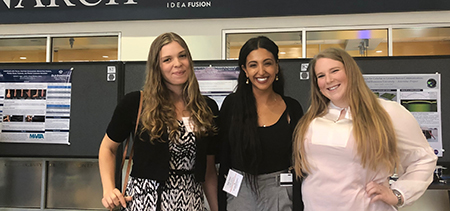College
College of Sciences
Program
Ph.D. Chemistry
Publication Date
3-28-2019
Abstract
Clostridium difficile is an anaerobic Gram-positive pathogen with high treatment costs and mortality and very high antibiotic tolerance. Antimicrobial host-defense peptides (HDPs) produced naturally by animal immune systems are promising candidates to develop novel therapies for bacterial infection because they cause oxidative stress that damages multiple targets in bacterial cells, so it is difficult for bacteria to evolve resistance to these attacks. Piscidins, fish-derived HDPs that can also form complexes with copper (Cu) to enhance their activities, are very active against multiple bacterial species in an aerobic environment. We examined their activity against C. difficile and other species in an anaerobic environment and found that the interaction of piscidins and copper is different in different oxygen environments. Piscidins are highly active against C. difficile and could be a good candidate for drug development.
DOI
10.25883/hps2-ph25
Files
Download Full Text (1.1 MB)
Recommended Citation
Oludiran, Adenrele and Purcell, Erin, "Characterizing the Activity of Antimicrobial Peptides Against the Pathogenic Bacterium Clostridium Difficile in Anaerobic Environment" (2019). College of Sciences Posters. 19.
https://digitalcommons.odu.edu/sciences_achievement/19



